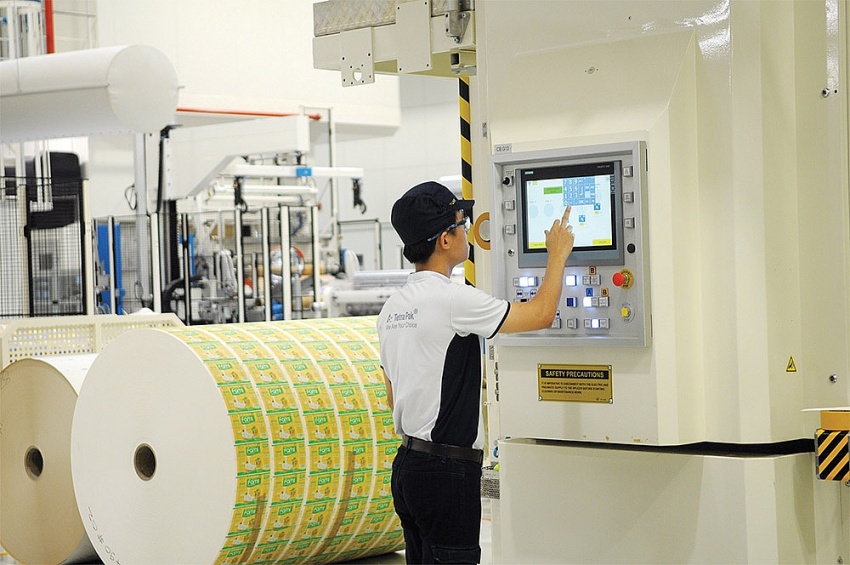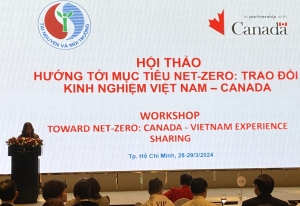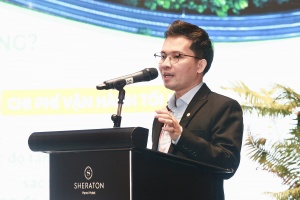EU relishes net-zero role with Vietnam
A delegation of Swedish companies joined a meeting with Vietnam Electricity (EVN) on October 17 to discuss the possibilities of cooperating in smart grid technology and energy operations, ahead of the October 21-23 Green Economy Forum & Exhibition (GEFE) 2024.
 |
| Green tech expertise is driving collaboration between Vietnam and global partners, Photo: Le Toan |
Chandan Singh, CEO of Hitachi Energy Vietnam, said, “Through innovation and teamwork, we aim to lead in sustainable energy solutions. Our partnership with Vietnam is a crucial step towards a greener future.”
The company’s offerings include helping to reduce the cost of power transmission through fewer required lines, increasing power transfer capability, improving reactive power balance and voltage profiles on transmission lines, and more besides.
Hitachi Energy entered Vietnam in 1993 and is now well entrenched across the country with 800 employees, a transformer factory in Hanoi, a high-voltage product factory in the northern province of Bac Ninh province, and offices in both Ho Chi Minh City and the central city of Danang.
Westermo Network Technologies, Svenska Kraftnät, Ellevio, Swedish Energy Agency, Swedish Energy Markets Inspectorate, Swedfund and EKN also offered a range of smart grid solutions last week, which could significantly benefit Vietnam’s energy sector by improving grid efficiency, integrating renewable energy, and enhancing overall grid performance.
According to David Åkerman, market director for Energy at Westermo Network, several key trends are driving the energy transformation, including decarbonisation, decentralisation with the introduction of photovoltaic and wind energy, distributed generation, cybersecurity, and more.
“The energy transformation drives digitalisation and leads to smart grids. The penetration of smart equipment emphasises the need for connected assets. And there are many different connectivity applications,” he added.
For instance, as heard at last week’s meeting, a large utility operator in Spain is moving to smart grid infrastructure in accordance with guidelines based on EU recommendations. The company is using a mixture of power lines to homes and data standards such as 3G, GPRS, and DSL to support smart metering and remote control of substations.
The potential for collaboration in green initiatives, including energy between Vietnam and international partners is significant, driven by the latter’s expertise in green technologies and finance capacity, and the former’s rapid development towards net-zero commitments.
According to the Swedish Embassy in Vietnam, even though Vietnam’s energy sector is undergoing rapid growth and transformation, challenges are inevitable. Some of them are transmission losses, voltage fluctuations, and limited capacity to accommodate renewable energy integration. In this context, international solutions can address these challenges and provide valuable insights.
Johan Ndisi, Swedish Ambassador to Vietnam, said, “Sweden has a long-standing reputation for its advanced and efficient electricity transmission and distribution systems. Like Vietnam, Sweden is a long and narrow country, necessitating a transmission system capable of handling long distances and fluctuating energy sources. Swedish companies have pioneered innovative solutions and technologies that have greatly improved grid operations, enhanced energy efficiency, and facilitated the integration of renewable energy.”
Like Swedish companies, other from European companies are also in the similar interest. Vietnamese successful stories by European-invested initiatives like Lego and Tetra Pak exemplify how international brands are supporting the country’s green transition.
For example, Tetra Pak earlier in the year added over $100 million of investment into its factory in the southern province of Binh Duong. The plant is one of the most advanced in the region, with the expansion in line with Tetra Pak’s commitment to environmental responsibility and corporate governance.
It is expected that about 8,000 participants will take part at GEFE 2024 this week. Held by the European Chamber of Commerce in Vietnam, it is expected to be a pivotal platform for collaboration among businesses, policymakers, and innovators to address Vietnam’s green transformation.
According to Julien Guerrier, Ambassador of the European Union to Vietnam, the EU is and will certainly continue to be a world leader in the area of green transformation.
“As climate change and green transformation are global challenges, the EU’s role is also to accompany its trade partners (and notably Vietnam) to achieve the net-zero emission goal by 2050 and the necessary economic transformation,” he said. “Our relevance for a transformation into a greener economy is even more important considering the activities and investments of EU companies in Vietnam, now facilitated by the EU-Vietnam Free Trade Agreement.”
 | Vietnam and Canada share opportunities to achieve net zero The path towards net zero was discussed at a workshop themed “Towards Net-Zero: Canada-Vietnam Experience Sharing”, held in Ho Chi Minh City on March 28. |
 | Green transportation paves path to net zero Environmental, social, and governance (ESG) responsibilities create competitive advantages and a sustainable development path for business as Vietnam aims to electrify 50 per cent of its public transport by 2030 and 100 per cent by 2050. |
 | EU underscores importance of trade with Vietnam While seeking to elevate its relations with Vietnam, the European Union has pledged to continue providing more support for the country in developing renewable energy and achieving its net-zero emissions, with fresh expectations for larger trade and investment cooperation. |
What the stars mean:
★ Poor ★ ★ Promising ★★★ Good ★★★★ Very good ★★★★★ Exceptional
Related Contents
Latest News
More News
- State corporations poised to drive 2026 growth (February 03, 2026 | 13:58)
- Why high-tech talent will define Vietnam’s growth (February 02, 2026 | 10:47)
- FMCG resilience amid varying storms (February 02, 2026 | 10:00)
- Customs reforms strengthen business confidence, support trade growth (February 01, 2026 | 08:20)
- Vietnam and US to launch sixth trade negotiation round (January 30, 2026 | 15:19)
- Digital publishing emerges as key growth driver in Vietnam (January 30, 2026 | 10:59)
- EVN signs key contract for Tri An hydropower expansion (January 30, 2026 | 10:57)
- Vietnam to lead trade growth in ASEAN (January 29, 2026 | 15:08)
- Carlsberg Vietnam delivers Lunar New Year support in central region (January 28, 2026 | 17:19)
- TikTok penalised $35,000 in Vietnam for consumer protection violations (January 28, 2026 | 17:15)

 Tag:
Tag:


















 Mobile Version
Mobile Version